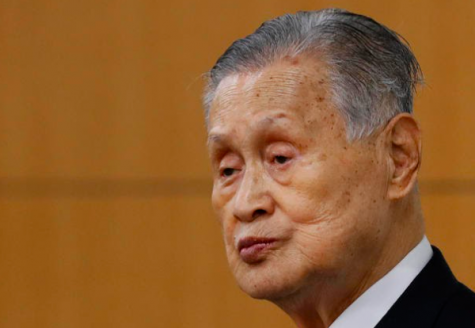Feminism is as Urgent as Ever
President of the Tokyo Olympics Steps Down After Sexist Remarks
March 3, 2021
The idea that “sexism is a thing of the past” embodies the modern misconception that discrimination towards women no longer exists. Many confuse new advancements, such as women having the right to vote in most places and the ability to get a higher education, with the idea that sexism was only an issue for women in the past. But the truth is, while major advancements have been made on a surface level, extensive work still needs to be done to weed out the instances of gender stereotyping and to resolve gender inequality worldwide. Indeed, this is the goal of feminism: to achieve social, economic, and political equality between the sexes.
Recently, international attention was turned to an example of sexist stereotypes and structures still at play in the workplace – a very prestigious workplace. On February 12, 2021, Yoshiro Mori, the president of the Tokyo Olympics organizing committee, turned in his resignation. When the Japanese Olympic Committee (JOC) proposed the idea of increasing the number of female board directors to more than 40%, Mori opposed the idea, saying that “a meeting of an executive board that includes many women would take time… Women are competitive. When someone raises his or her hand and speaks, they probably think they should speak too. That is why they all end up making comments.” Though his own board currently held seven women, he was fine with them because these women all “knew how to behave.” Yoriko Koike, a powerful female Japanese politician and the current governor of Tokyo, was left “speechless” by Mori’s remarks. Yoshiro Mori’s sexist comments resulted in immediate backlash from the media and the eventual call for his removal.
Yoshiro Mori’s comments illustrate the problematic gender stereotype sometimes held by men, and any person who holds toxic female biases, that women are loud rather than strong and opinionated. They are considered talkative and annoying rather than thoughtful and intelligent. This harmful stereotype is not restricted only to Olympic committees. Its presence extends everywhere in our society, from the invalidation of the roles of strong women in politics to young girls being seen as “know-it-alls” upon sharing in class, to men interrupting women at the family dinner table. While Mori hastily apologized for his remarks in a news conference a week later, he also said he would “not be stepping down.” But with Yoriko Koike refusing to attend an Olympics meeting with Mori the following week, and because of the power behind the feminist hashtag ‘Mori, Please Resign’ on Twitter, he was finally pressured into giving up his post and authority. This proves that feminism is as urgent as ever because without these online protests, Mori and his ideas would still hold power.
Mori’s high profile has shed light on these toxic gender stereotypes, ones that too often go unaddressed. One of Japan’s major daily newspapers, The Asahi Shimbun, reports that Mori’s remarks even “provoked laughter from some JOC council members,” showing that while other people may not be as blatant as Mori, this way of thinking is not uncommon. Mori’s stance and the gravity of this event clearly amplified the work that needs to be done. This moment showcases the necessity of raising awareness around sexist stereotypes, not just by giving women a seat at the table, but by also handing them the mic.
*Note- My article looks specifically at sexism towards women, but I would also like to acknowledge that gender is not binary, and that gender-based bias and discrimination impacts a wide variety of genders, not only women.
